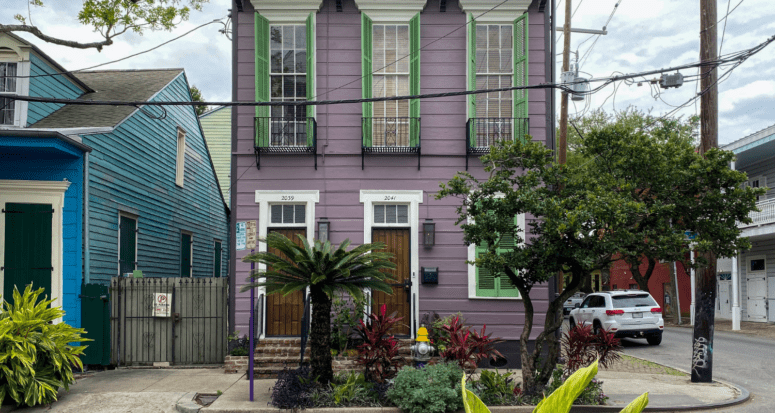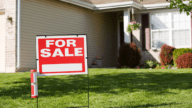How to Sell a House By Owner in Louisiana: A Pelican State FSBO Guide
- Published on
- 15 min read
-
 Dwayne Vega, Contributing AuthorClose
Dwayne Vega, Contributing AuthorClose Dwayne Vega Contributing Author
Dwayne Vega Contributing AuthorDwayne Vega is a freelance writer with a specialization in real estate content. He works closely with B2C and B2B companies providing useful and engaging content that converts viewers into clients. When he isn’t writing for work, you can find him reading and writing for his ongoing MFA in Creative Writing.
-
 Sam Dadofalza, Associate EditorClose
Sam Dadofalza, Associate EditorClose Sam Dadofalza Associate Editor
Sam Dadofalza Associate EditorSam Dadofalza is an associate editor at HomeLight, where she crafts insightful stories to guide homebuyers and sellers through the intricacies of real estate transactions. She has previously contributed to digital marketing firms and online business publications, honing her skills in creating engaging and informative content.
Some Louisiana home sellers looking to skip real estate agent commissions consider the option of For Sale by Owner (FSBO — pronounced fizz-bow). By handling everything from pricing and marketing to negotiations, they’re able to avoid fees in a traditional home sale and maintain control over the home sale process.
However, it’s not a popular route: FSBOs only represent 6% of home sales in 2024. Part of the reason is that this selling approach comes with unique challenges, which is why it’s important for homeowners to familiarize themselves with the ins and outs of how to sell a house by owner in Louisiana.
In this guide, we’ll walk you through the steps of selling by owner in the Pelican State, including some of the difficult aspects of the sale, so you can better prepare yourself. We’ll also provide a comprehensive overview of the full process of preparing, marketing, and closing on your home without the assistance of a real estate agent.
Note: Once you’ve seen what’s required, you can roll up your sleeves and get started with your FSBO sale. Or — in the event you’d prefer to work with a real estate agent — HomeLight would be happy to introduce you to highly-rated professionals in your Louisiana market who can help you command top dollar and provide a low-stress selling experience.
How does selling by owner (FSBO) work in Louisiana?
Disclaimer: This blog post is intended for educational purposes only. HomeLight recommends that you look into the real estate regulations for your area and consult a trusted advisor.
FSBO is a method of selling your home without the involvement of a listing agent. In a FSBO scenario, the seller assumes the responsibilities that would normally fall to their agent, such as pricing the home, marketing it to potential buyers, arranging showings, and negotiating the deal. This primarily enables sellers to save on commission fees.
Agent commissions
For decades, the seller has been responsible for paying agent commissions, which typically range from 5% to 6% of the home’s sale price in a traditional agent-assisted sale. This fee was split between the listing agent and the buyer’s agent. Recently, however, agent commission rules have changed following the historic National Association of Realtors® lawsuit settlement.
Under the new commission structure, sellers are no longer required to pay their buyer’s agent’s fee, as buyers are expected to negotiate directly with their agents. Thus, sellers working with an agent only have to cover their listing agent’s fee, which is about 2.5% to 3% of the home’s sale price, depending on negotiations.
But while these new rules aim to reduce fees, some sellers still feel the need to cover the buyer’s agent’s fees to entice more buyers or expedite a sale. Thus, if you partner with a realtor, you may be looking at paying a commission of 3% (your listing agent’s fee) to 6% (your listing agent’s fee and your buyer’s agent’s fee) of the home’s sale price.
Commission savings
By selling FSBO, you can eliminate the cost of the agent commissions since you won’t have a listing agent. If you decide to cover the buyer’s agent’s fee, you’ll only pay around 2.5% to 3% of the home’s sale price, still saving you a good chunk of money.
Even with new commission rules in place and in a FSBO transaction, buyer’s agents expect compensation for the work they do to bring a buyer to a sale, such as arranging showings and helping to tee up and qualify the buyer. Plus, when a seller isn’t working with an agent, the buyer’s agent may end up carrying more of the weight to get the deal to the finish line.
Next: Consult our guide on who pays closing costs when selling a house by owner for more details.
A FSBO sale does not mean that a seller won’t need any professional assistance. While Louisiana doesn’t require a real estate attorney at closing, FSBO sales typically warrant legal and professional oversight of some kind to avoid an abundance of legal risk.
Most people who sell by owner will need to hire an attorney to review and prepare key documents and make sure paperwork is filled out properly, such as the seller’s disclosures. We’ll address what disclosures are required when selling a house in Louisiana later in this post.
Why sell a house by owner in Louisiana?
The top reasons people cite for selling FSBO include selling to a relative, friend, or neighbor (38%) and avoiding agent commission or fee (30%).
To get a firsthand perspective on selling homes in Louisiana, we spoke with Charlotte Johnson in Bogalusa, Louisiana, who sells properties fast, 56% quicker than the average Bogalusa real estate agent.
Johnson says Louisiana FSBO sellers she encounters “think that they can sell the home, won’t have to pay a commission, and usually, it’s to save money.”
However, 2024 data shows that FSBO homes sold for a median of $380,000 in 2023, significantly lower than the agent-assisted homes that sold for a median of $435,000.
As you can see, FSBO is a mixed bag. So, before we share our selling tips, let’s lay out some pros and cons to help you decide if this is the route for you.
Pros of selling a house by owner
- You can save on listing agent commission fees, usually around 3% of the sale price.
- You’re completely in charge and can manage the sale as you please.
- You can directly communicate with buyers.
- You’ll be able to devote your time and energy to selling your property your way.
Cons of selling a house by owner
- You may sell your home for less. You’re negotiating without help from an expert, which could mean leaving money on the table. For example, according to Johnson, FSBO homes in Louisiana can leave as much as 17% of the home’s sale price unearned and on the table.
- You may price your home inaccurately. Johnson notes that a lot of homeowners in Louisiana have an inaccurate impression of what their house is worth, and they don’t know the market. That often causes them to settle for much less in a sale. On the flip side, you may be tempted to price too high and risk leaving your property sitting on the market too long.
- You may not effectively screen potential buyers. Johnson explains that even if you list the house for sale right and get an offer, an FSBO seller has no way of vetting the buyer, and they may not be qualified to purchase your home. That’ll jeopardize your sale.
- You may wait longer for the home to sell unless you already have a buyer lined up. Without an agent’s expertise, FSBO listings tend to have limited exposure.
- You manage all communications and negotiations yourself, a time-consuming effort. Not having a communication buffer can be a downside if the buyer pushes back or says negative things about your property.
- You may have difficulties marketing your home, especially when you’re unfamiliar with how online platforms work.
- You’ll still have selling costs, which may include transfer taxes and settlement fees. Not having agent representation could also lead to paying more in seller concessions.
- You may put yourself at legal risk. Without the help of an agent to guide you through the disclosure process, you may be held liable for potential future problems with your home.
In spite of the cons, we’ll help you navigate the challenges of FSBO if you’re committed to selling your Louisiana house without agent assistance. For some, selling a home FSBO is a challenge worth accepting, and success can be measured in more ways than one.
A feature of your home that adds value is land. People want land and a home. Buyers want more space now to enjoy their home. Things that I see reduce the value of a home is if they’re in a flood zone. Flood insurance is getting more expensive, so being in a flood zone detracts from the value of your home.
 Charlotte Johnson Real Estate AgentClose
Charlotte Johnson Real Estate AgentClose Charlotte Johnson Real Estate Agent at Keller Williams Realty
Charlotte Johnson Real Estate Agent at Keller Williams Realty
- Years of Experience 9
- Transactions 824
- Average Price Point $172k
- Single Family Homes 816
Steps to sell a house by owner
Next, let’s review the FSBO process step by step.
1. Prepare your house for sale
Whether you’re selling with an agent or FSBO, at a minimum, you’ll want to get your Louisiana home into respectable shape before any showings to increase your chances of receiving a fair price. Here are a few standard tasks to add to the list.
Indoors
These efforts will go a long way toward impressing buyers looking for a home in Louisiana:
- Declutter floors, shelves, and surfaces throughout the home.
- Make small fixes and repairs, like a leaky faucet or broken door handle.
- Lightly update with new light fixtures, faucets, or cabinet hardware.
- Refinish hardwood floors.
- Repaint bold walls (or those that look dingy) in a neutral color.
- Reduce furniture in crowded rooms, keeping stuff in a temporary storage unit when selling a house full of stuff.
- Stage the home with final touches like fresh-cut flowers or a basket of fresh produce.
- Use rugs to define spaces and place them strategically.
- Deep clean until the house is sparkling.
Johnson says, “Go to one of the big paint companies, find out what the color of the year is, and apply a coat of fresh paint. It’s an update that makes people see the home as more modern.”
Outdoors
Data from HomeLight’s Top Agents Insight Report shows that 31% of agents agree that larger or improved outdoor spaces or garden areas are the biggest selling points of a house. Moreover, 92% of realtors recommended improving curb appeal to sellers before listing the home for sale.
Some important curb appeal upgrades can include:
- Mow the lawn and pull weeds.
- Apply fresh mulch liberally.
- Upgrade your landscaping. Consider a new walkway, flowerbed, or shrubs.
- Add a fresh coat of exterior paint.
- Install a new garage door if yours is looking old or not working properly.
- Pressure wash the outside of your home to get rid of spiderwebs.
- Soft wash the roof to clean the dirt caused by hurricanes and humidity.
Johnson says, “We’re impacted by hurricanes down here. Sometimes a roof looks like it’s in rough shape. [But] really, it’s just dirty because we’re so humid. We have so much humidity down here. If you soft wash your roof, it can look brand new. People will see that there’s nothing wrong with it.”
2. Do the homework necessary to set a competitive price
You’ve arrived at a critical moment in your FSBO process: setting a listing price. 28% of agents said the most common reason buyers walk away from the negotiating table is an overpriced property.
This is why it’s important to get your home price right to reach a successful home sale. When pricing the property, you don’t want to leave money on the table, yet you want to encourage activity on your listing.
Before listing a home, an agent usually conducts a comparative market analysis (CMA). This is a highly detailed study of “comps” or similar homes nearby that have sold recently, are pending, on the market, or were previously listed but taken off the market. Some may have been pulled off the market without a sale.
Johnson notes, “FSBO sellers in Louisiana tend to misprice their home because they don’t understand the market. When they overprice the home, it’s going to sit on the market. When they finally come to me to list it, [potential buyers] have already grown tired of looking at the home.”
Without an agent, you’ll miss out on the complexity of a full CMA and the know-how to interpret it.
However, with a little time and money, you can set a competitive price yourself.
Conduct your own “CMA Lite”
It’s time to roll up your sleeves and research.
Start with an online home value estimate
As a starting point, look at several online estimators for your home’s value. HomeLight’s Home Value Estimator aggregates publicly available data such as tax records and assessments, your home’s last sale price, and recent sales records for other properties in the same neighborhood.
We also add a new layer of information to our estimates using a short questionnaire. Tell us a few details about your Louisiana home, such as:
- How much work does it need?
- What type of home is it (single-family, condo, townhouse, or other)?
- Roughly when was your house built?
- Are you planning to sell soon?
Using these insights, we’ll provide you with a preliminary estimate of home value in under two minutes.
Whether you use Zillow, Chase, Realtor, or Redfin to get a home value estimate, think of any online home price tool as a first step (not your only source of truth) — and recognize that the data used may be limited.
Narrowly filter your search for comps
When you’re ready to find comps, you can choose from sites like Zillow, Trulia, Redfin, or Realtor.
You’ll want to filter your searches to the area very near your house (within blocks if possible) and with similar characteristics. If you’re not finding any comps, expand your search map.
You’ll also want to filter results by details like:
- Listing status (look at recently sold, pending, and active)
- Number of bedrooms
- Number of bathrooms
- Square footage
- Home type (single-family, condo, etc.)
Beyond the above criteria, the more houses you find with floor plans and an age similar to yours, the better.
Use a site like Zillow to collect your data
As an example, let’s take a look at how to filter your search for comps on Zillow.
- Navigate to Zillow.
- Type in your address. If a pop-up with your home’s specs appears, close it with the “X” on the top right (or sometimes you must click “Back to search” on the top left).
- Filter by “sold.” Yellow dots should appear on the map surrounding your house, and you will see all the recently sold homes on the right.

- Now, filter by the number of bedrooms and bathrooms and check the box “Use exact match.”

- Next, filter by home type.

- Next, select the “More” box. Here, you can specify square footage, lot size, and year built.
- While still in the “More” filter box, scroll down and select to view houses that sold in the last 30 days. If you find there are not many results in your area, try expanding to 90 days. However, the further back you go, the less relevant the comps.

- If necessary, click the plus or minus buttons to widen the search area.
- Once you’ve collected data for sold houses, revise or restart the search to view active and pending listings, as well.
Invest in an appraisal
If you want to reduce guesswork further, top agents recommend paying an appraiser to get a professional opinion of the value of your home. An appraiser will combine recent property data, market research, and information collected from a walkthrough of your home to determine an appraised value.
An appraisal for a single-family home will likely cost $300 to $400—well worth it to avoid potentially over- or underpricing your house by thousands. If you get an appraisal, you need to be ready to sell your home soon.
Johnson explains, “Appraisals are only good on the day it’s done, and it’s an evaluation and just an opinion from the person doing the appraisal that day. I’ve seen appraisers value a home at a certain amount, then when I list the home for $30,000 higher than the appraisal, they appraise it for my listing price.”
Make sense of the research
Compare your home’s features against the nearby comps you collected. Hopefully, the houses you studied give an indication of an appropriate price range for your home. From there, you can make dollar adjustments based on characteristics that add value (patios, curb appeal, an extra bedroom) versus detracting from it (a busy street, deferred maintenance, less square footage).
Consider the differences and similarities of comps with the appraised value of your home to choose a price that will encourage activity (too high, and it may seem out of reach to many buyers), but will also maximize your profit.
Johnson says, “A feature of your home that adds value is land. People want land and a home. Buyers want more space now to enjoy their homes. [What] reduces the value of a home is if they’re in a flood zone. Flood insurance is getting more expensive, so being in a flood zone detracts from the value of your home.”
3. Photograph your home
Listing photos are powerful, either pulling in buyers for showings or keeping them away.
To give your listing an edge, consider hiring an experienced real estate photographer. While they may charge as much as $110 to $300 per session, this could be one of the most important things you do to sell your home.
Johnson describes home photography’s power, “Buyers have one shot of looking at your house and deciding that they want to go see it. People take eight seconds when looking at a photo to decide if they want to see your house or not.
“If you take cellphone photos or dark photos, you’re not getting the exposure you need. Buyers will look, and then pass over it. Real estate is a numbers game, and professional photos drive traffic.”
But if you do go the DIY route, make sure to:
- Use a good camera with a wide-angle lens.
- Pay attention to lighting.
- Include a photo of every room.
- Take multiple pictures of living areas, kitchens, and bathrooms.
- Try shooting different angles.
Review our guide on how to take quality real estate photos for further guidance.
4. Create a detailed, compelling listing
Along with stellar photos, you’ll want to craft an informative and compelling listing. Leverage both the listing description (a paragraph or two highlighting key features) and the property details to show potential buyers all about your home and what makes it desirable.
Tell a story with your description
Draw in potential buyers with a powerful listing description that tells a story about your Louisiana house. Include details like:
- Your home’s most unique and desirable features, like a breakfast nook or sunroom
- Recent upgrades like a kitchen or bathroom remodel, a new roof, or an HVAC system
- High-end appliances, materials, or finishes
- Outdoor features like a pool or patio
- Neighborhood features and amenities
- Nearby parks, walking trails, restaurants, and attractions
In addition to these, research words in other listings to see what people are looking for in a house. For instance, Johnson says some Louisiana buzzwords include the following: no carpet, granite or block countertops, farmhouse style, and open floor plans.
Johnson says, “You need a strong listing description. The internet has changed how people shop for houses, but it also changed how agents look up houses in the multiple listing service (MLS). Now we look for all of the buzzwords. Buyers and agents know specifically what they’re looking for.”
Don’t skimp on the property details
Aside from writing the description, you may be prompted to enter information like:
- Age of the home
- Square footage
- Architectural style (i.e., split-level, rancher, craftsman)
- Appliances included
- Exterior building materials
- Flooring types
- HOA fees
- School zone information
- Lot size
Many real estate agents and potential buyers read the “fine print” on your listing, so include accurate details and plenty of them.
For example, we know Louisianan buyers place a premium on land. To highlight that feature of your property, Johnson says your listing should include the number of acres of your property. “Buyers usually look for a certain size of property, and they’re specific when searching,” she shares.
5. List your home online
It’s finally time to post your Louisiana home online. While you can create FSBO listings for free on popular search sites, you’d have to painstakingly post site by site, and your listing wouldn’t reach the majority of buyers and agents.
To give your home the most exposure, pay to have it put on your local MLS. This is a platform agents use to share properties with one another and on major real estate sites. Posting there will feed your listing to buyers’ agent databases and to common sites buyers use.
Only licensed real estate agents and brokers who are MLS members can post to the MLS. However, you have two options to gain access: paying an agent to post for you or using a FSBO platform online.
Pay an agent to list your home on the MLS
A local agent may be willing to list your house on the MLS for a flat fee, without any other involvement in your real estate transaction. If you decide to go this route, make sure you ask whether the fee includes updating your listing if necessary.
Use a FSBO platform with an MLS option
There are a variety of paid websites that you can use to list your Louisiana house online as “for sale by owner.” These sites offer packages ranging from about $100 to $400 for just a listing, or a larger flat fee of $3,000 to $5,000 that includes any number of additional professional marketing services.
Some of these companies display their rates on their websites, but others won’t quote a fee until you input your address or select an area of the country. A few examples include:
It’s important to note that most of these companies serve FSBO sellers nationwide, which can cause challenges if the assisting representatives don’t understand the local market trends in your Louisiana neighborhood.
Whatever you choose, read the fine print carefully: some sites may have hidden fees or even take a percentage off your sale — a detour you’d rather avoid on the FSBO route.
Not willing to pay for the MLS?
If you’re determined to save money by forgoing the MLS, creating a free FSBO listing on Zillow might be your top option. You can post videos and unlimited photos, and get fairly wide exposure via Zillow and the Zillow-owned Trulia.
6. Market your home
Now it’s time to spread the word about your Louisiana home.
Experienced agents like Johnson know that posting a home on the MLS is just the beginning of the marketing phase. A successful home sale requires a deliberate and targeted marketing plan to reach the right buyers and attract the best offers.
Johnson says, “People are moving to Louisiana from Colorado, New York, and Iowa. I specifically target these areas using a report that highlights these states that people are exiting in favor of Louisiana. They want to know about low property taxes, that our weather isn’t twenty degrees below zero, and we don’t have four feet of snow.”
Here are some of the steps you can take to market your home:
Place a nice FSBO sign by the road
Consider getting a custom yard sign rather than purchasing a generic one you write on with a Sharpie. You can order a custom sign on a site like Vistaprint with your contact information, plus a stand, for as little as $25 plus shipping. Note that some MLS providers may have rules about whether you can post a FSBO yard sign while your home is on the MLS.
Share on social media
Share your home across social media. Ask your friends to share your posts.
Johnson says, “I use targeted Facebook advertising. I do a lot of advertising on that social media platform. The house just pops up on their feed. People from Colorado and New York say ‘Wow, this $300,000 house would’ve been $800,000 here. I’m moving.’ Lower property taxes and cost of living enable people to live on their retirement.”
Hold an open house
Try these strategies for a successful open house event:
- Share details on Facebook and Nextdoor.
- Update your MLS listing with the open house details (if you’re able to, as part of paying the flat fee), or update your DIY FSBO listing.
- Place open house signs at nearby intersections.
- Tidy up the house before potential buyers come through.
- Pass out info sheets with the address, bullet points about the house, your contact info, and perhaps one photo.
- If you can, collect visitors’ info, then follow up later to ask if they have any questions.
Find more expert tips for how to hold an open house.
7. Manage showings
If your marketing is successful, your next step will be to show the home to prospective buyers. Welcome to the busiest phase of the home sale process. According to Johson, a major reason some FSBO sellers switch to an agent is that they underestimated the time, energy, and expertise needed to manage this crucial step.
Johnson says, “You have one chance to impress buyers with your home, and they’re not going to be as impressed by the things in your home because you have a vested interest. It’s extremely difficult, and you have to say goodbye to your personal life. Real estate is time-sensitive, and if you don’t have time to show your house when someone needs it, you’re going to miss out on a sale”
To manage the logistics of showings:
- Respond to inquiries ASAP.
- Set end times if you need to fit many showings in one day. This will also create a sense of demand and urgency for buyers to place offers.
- Remove or secure valuables.
- Make sure the home is clean and tidy for showings.
- Follow up with buyers’ agents after showings to get their feedback.
Johnson advises, “FSBO sellers have to avoid overselling the home. Buyers pick up on that.”
Should you be present for showings?
If you’d rather not be present for every showing, consider using a lockbox with a code to let buyers’ agents enter the house. This is standard industry practice among agents. To ensure you’re working with someone legitimate, use the Louisiana Real Estate Commission’s Verify License Search tool or sites like arello.com to check their real estate license number.
With unrepresented buyers, plan to be on the property for the showing. During a showing, we recommend you:
- Point out a few highlights of the house.
- Let buyers look without hovering.
- Be prepared to answer questions.
- Avoid the temptation to tell all — let the house and listing do the talking.
Johnson says, “Buyers don’t even like looking at a home where the owner is there. A lot of people just shy away. They don’t want to feel uncomfortable looking at the house when the owner is present. People who don’t shy away from it are usually not motivated buyers, but are just looking or even getting ideas for things to do for their own house.”
8. Evaluate offers, negotiate a deal, and make disclosures
You’ve got your first offer — congratulations! Before signing anything, Johnson says, “there is no use in starting a negotiation process unless the person can actually buy your home.”
In addition, Johnson explains, “You need to know that the loan is good, or they have the cash in the bank if they’re paying cash.”
Here are key considerations when considering an offer on your Louisiana home:
- Vet potential buyers by requiring a mortgage pre-approval letter or proof of funds.
- Require everything in writing.
- Counter-offer and negotiate.
- Look for a good real estate attorney. (See the next step!)
Property condition disclosure
In Louisiana, a residential property seller is generally required to disclose the condition of the home to the buyer before they make an offer. If the seller provides the disclosure form after the buyer makes an offer, the buyer can terminate any real estate contract, or withdraw the offer up to 72 hours after they receive the form.
Louisiana doesn’t follow the caveat emptor (buyer beware) rule. Thus, sellers have the duty to inform buyers of the property’s material defects.
Whether required by law or not, some sellers may prefer to provide the disclosures before an offer has even been presented so that a prospective buyer is more informed beforehand and less likely to withdraw from a deal later on.
In an agent-assisted sale, your listing agent would likely provide you with the required disclosure form(s). However, as a FSBO seller, you can find the form online.
What will you be asked? In Louisiana, you can expect to disclose any significant defects or issues you’re aware of concerning:
- Land: Length of ownership, lot size acres, servitudes or encroachments, vested rights, and wetland designation by the Army Corp of Engineers under §404 of Clean Water Act
- Termites, wood-destroying insects, and organisms: Damage to the property, repairs, or lack of repairs to damage
- Structures: Age, additions, alterations, permits, age of each structure’s roof, and any defects or damage in the structure (roof, walls, floor, attic, ceilings, foundation, basement, etc.)
- Plumbing, water, gas, and sewage: Defects regarding the plumbing system, piping, gas service, water heater, or sewage supply source
- Electrical, heating and cooling, appliances: Electrical, heating and cooling systems, fireplace, permanently installed or built-in appliances, and security system
- Floor, flood assistance, and flood insurance: Flooding, water intrusion, accumulation, or drainage issues, flooded by rising water, flood zone classification, and if the home carries flood insurance or is receiving federal disaster assistance or part of the Road Home Program
- Miscellaneous: Building restrictions, restrictive covenants, historic district, usage or safety conflicts, government liens or taxes, pending litigation, HOA membership, animal or pet presence, the presence of hazardous materials (asbestos, radon, mold and mildew, formaldehyde, meth labs, etc.) and other possibly hazardous situations, such as solution mining injection wells
Louisiana also has a mandatory disclosure form for the presence of lead-based paint and lead-based paint hazards.
If in doubt about a problem with the home’s condition, most top real estate agents would recommend you disclose it. If you know of an issue and choose not to disclose a major problem, and that defect is later discovered, you could be held liable for damage or subsequent costs.
9. Close the sale — with professional help
Time to button up that deal.
While some states require that FSBO sellers hire a real estate lawyer to help close their sale, Louisiana does not.
However, it’s still a good idea to invest in the services of an experienced attorney as you close one of the biggest and most complex deals of your life. By doing so, you’ll minimize your legal and financial risk, plus simplify the process for yourself.
Johnson says, “You don’t need an attorney, but you may get one if you want to get the title. Somebody needs to run the title.”
Real estate attorney fees can vary depending on location and how much help you want or need. In Louisiana, they generally range from $151 to $360 per hour, well worth it for professional guidance in closing one of life’s largest legal transactions.
FSBO mistakes to avoid in Louisiana
On your FSBO journey, watch out for these major pitfalls:
- Missing out on the MLS
- Over- or under-pricing
- Letting your house sit on the market too long
- Not being open to paying the buyer’s agent commission
- Failing to vet buyers and ensure they’re properly funded
Johnson says, “People who are not properly funded can delay or kill deals. Another thing is an inspection. The buyer has representation to help negotiate and an FSBO seller doesn’t. So when buyers want to do an inspection, some FSBO sellers panic and deny anything is wrong with their house so they don’t have to fix it.”
Johnson reminds FSBO sellers, “In most cases, buyers will have representation. You should too, and if you can’t find an agent who can earn more than the six percent fee you’re worried about, you need to find another agent.”
Alternatives to selling by owner in Louisiana
If you decide you don’t want the hassle or pressure of FSBO, you’ve got other solid options.
Enlist the help of a top-rated real estate agent
Ultimately, the services and price gains you can get with an experienced real estate agent may put more money in your pocket than FSBO. A proven agent is also better equipped to help you achieve your selling and moving timelines.
Johnson shares an anecdote about an interaction with a FSBO situation: “A buyer found a home that was underpriced and bought it at a discount. That buyer hired me to help sell the home, and we sold it for $75,000 more than he bought it without any improvements or renovation. [There was] no reason other than it had been mispriced.”
Interested in such expertise? HomeLight can connect you to top-performing agents in your Louisiana market. Our free tool analyzes over 27 million transactions and thousands of reviews to determine which agent is best for you based on your needs. It takes only two minutes to receive your matches.
Request a cash offer to buy your Louisiana home
If you’d like to skip the sale prep altogether — plus avoid paying agent commissions — you can opt to sell your home “as-is” to an all-cash buyer instead.
For a low-stress experience, consider requesting a cash offer from HomeLight’s Simple Sale platform. Tell us a few details about your home, and in as few as 24 hours, we’ll send a no-obligation all-cash offer your way. If you decide to accept the offer, Simple Sale sellers have the ability to close in as little as 10 days.
Without leaving the Simple Sale platform, you’ll also be able to compare your cash offer to an estimation of what your home would sell for on the open market so you can make an informed decision.
Ready to sell your Louisiana home?
Unless you already have a buyer lined up, selling a house by owner in Louisiana requires a significant investment of time and effort. You’ll need to pull your own comps, capture excellent pictures, create a listing, market the house online, field inquiries, host showings, negotiate, and close the deal. And that’s after preparing the house itself.
You also have to consider that FSBO listings tend to sell for less than agent-assisted sales. An experienced agent who knows the area can make recommendations for targeted upgrades to help you maximize your sale price and get a premium offer. This can help to offset or, in some cases, more than make up for the cost of commission — while saving you time and headaches.
If you choose to go FSBO, you should have a good idea of what to expect from the process now. Otherwise, partner with a competent agent. Our internal transaction data at HomeLight shows that the top 5% of real estate agents sell homes for as much as 10% more than the average. Connect with some of the best agents in your Louisiana market.
Writer Hayley Abernathy contributed to this story.
Header Image Source: (Josh Doguet / Unsplash)








